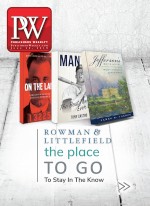After several years in which many publishers took a conservative view of licensing, the pendulum seems to be swinging back toward a more expansive outlook. Licensing Expo wrapped up in Las Vegas on June 6, and a number of publishing executives in attendance who oversee licensing said that they are actively adding new licenses, experimenting with new formats, and/or looking at nontraditional properties.
Penguin Young Readers has ramped up its licensing activity of late, doubling its property count in the past 12 months. “Two years ago, we were more selective, but now we’re going for it in a more aggressive way,” said Daniel Moreton, v-p and associate publisher at Penguin Workshop.
Readerlink’s Studio Fun imprint is expanding into formats outside of its traditional interactive novelty and soundbook titles, such as 8×8s. “We don’t do 8×8s and readers often, since the rights are with other publishers,” said Rosanne McManus, v-p and publisher. “But we like to, because novelty and storybooks are in just one section at retail, while 8×8s and readers get us into the racks.”
Publishers are not just looking for licenses around which they can create full six-to-12-book programs; they’re also looking for those that they can marry with their proprietary formats. Penguin continues to expand its licensed Mad Libs roster and has more recently begun to pair licenses with its Who HQ franchise. Under the latter umbrella, it launched a series called What Is the Story of..., which tells the true story of how fictional characters came to be, featuring licenses such as Hello Kitty, Scooby Doo, and Wonder Woman.
“If it’s a strong brand, licensors want to be in all the formats, and our Movie Theater Storybook can sit alongside Phidal’s Busy Box with the same license,” McManus explained. “We each have our own lanes to play in.”
Sophie Partridge, executive v-p and publisher at Phoenix International Publications/PI Kids, said, “The studios realized that opportunities have been missed because the rights were tied up with one master publisher.”
Publishers also continue to look for new formats or bells and whistles that will stand out, whether that means adding stickers, designing shiny or glittery covers, or creating unique in-world titles. “It’s about innovation—that’s the key,” said Dion Vlachos, executive v-p, consumer products, licensing, and retail sales at Viacom Nickelodeon Consumer Products. “At the lower end, you need to offer something that has high perceived value and pops on the shelf but is also affordable in today’s world. For formats at higher price points, you need fresh ideas and true differentiation.”
Random House Children’s Books adds unique features to many of its licensed titles, according to Chris Angelilli, v-p, editor-in-chief, and executive director of licensed publishing. For Trolls, it released a strong-selling spring title that is heart shaped and glittered, as well as a coloring and activity book that is full color rather than the traditional black-and-white. Stranger Things formats include an in-world journal in the style of the Trapper Keeper loose-leaf binder that was popular in the 1980s, when the series is set. And its tie-ins to Nickelodeon’s preschool series Butterbean’s Café include a scratch-and-sniff title to capture the aromas of the bakery where the show takes place.
Penguin, on the other hand, is going back to basics. “We were trying to lean into more unique formats, and we will still do something new and unique if it makes sense,” Moreton said. “But now we’re really increasing our title count in the core formats of readers and especially in the 8×8 space.”
For licensors, publishing has always been a significant category, but it is taking on even more importance, as studios need to create a continuous stream of content to support their properties. “Hasbro has recognized the engine publishing is when it comes to developing content,” said Michael Kelly, v-p global publishing, who meets regularly for creative conversations with his colleagues at Hasbro Studios. “We can help and influence every aspect of the business, from entertainment to digital games, to consumer products.”
MGM is looking to reinvigorate its licensing program in the U.S. “Publishing is an important area, because it allows us to craft and expand the story and bring new customers to the brand,” said Robert Marek, executive v-p, global consumer products and experiences. Books will be a core component of the licensing efforts for MGM properties such as Are You Smarter Than a 5th Grader, Legally Blonde, and Pink Panther.
Nickelodeon recently licensed Abrams to develop a series of middle grade fiction inspired by influencer JoJo Siwa. “We’re developing short-form animation now based on the mythology they created for the books,” Vlachos reported.
Speaking of influencers, publishers continue to look for new types of properties beyond films and traditional TV shows—notably streaming content and content produced by YouTubers. Studio Fun is launching books tied to Blippi, a comedic YouTuber who helps toddlers learn about everyday activities such as brushing their teeth. The program will start with two 8×8s in fall 2019.
“We’re always looking to see what’s out there, and we’ve expanded our search to include YouTubers and games,” Angelilli said. Noting that Nickelodeon has recently signed consumer products and content deals with influencers Isabella de la Torre and Ryan’s World, he observed, “When Nickelodeon embraces influencers, you know something is happening.”
Still, these newer properties are not without their challenges. YouTube is where kids are spending their time, and properties on the channel often attract billions of views. “But what does that really mean?” asked John Russell, licensing director at PI Kids. “It makes evaluating YouTube properties difficult.”



 Volume 266
Issue 23
06/10/2019
Volume 266
Issue 23
06/10/2019





